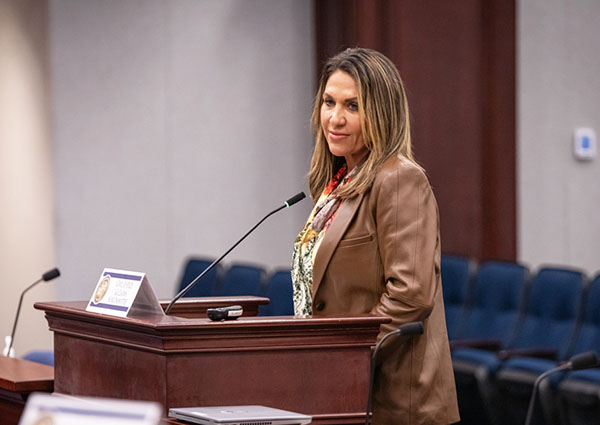In her first legislative session since winning election in November 2024, State Rep. Meg Weinberger (R-District 94) made strong headway with bipartisan victories in animal welfare and environmental policy. But several reform measures on housing, education and public records stalled before reaching the floor.
Weinberger co-authored House Bill 255, which provides a sentencing multiplier for specified acts of animal cruelty and requires the Florida Department of Law Enforcement to create an animal cruelty offender’s database on its web site.
Also known as “Dexter’s Law,” the bill refers to a shelter dog that was adopted and found beheaded in a Pinellas County park a few days later.
“This is an issue dear to my heart,” said Weinberger, who has long been involved with animal rescue organizations. “This was a sweet and loving dog… one of God’s creations. I want to be a voice for those who don’t have one, and speak up and say, ‘This is not OK.’”
Leaning heavily on an endorsement from Donald Trump, Weinberger won her seat by defeating three other candidates in the August 2024 Republican primary, then easily dispatching Democrat Rachel Litt in the November general election.
Weinberger said that she was disappointed that she was not able to bring home to the City of Westlake the $600,000 in state funding officials there had hoped to receive for construction of a 50-acre regional park off Seminole Pratt Whitney Road.
While it was approved by the legislature, Gov. Ron DeSantis cut the funding in a last-minute line-item veto. Weinberger said she was not given an explanation.
“I hope we get it next session,” she said.
However, Weinberger was pleased that she was able to bring home some $10 million to her vast district, which covers much of the western communities, including the Acreage/Loxahatchee area, Loxahatchee Groves, Royal Palm Beach and Westlake, as well as Palm Beach Gardens and other areas.
The $10 million included $450,000 to help the Indian Trail Improvement District move engineering and planning forward for construction of the M1 Impoundment.
Another big win for Weinberger was HB 1127, a child welfare bill that launches a four-year pilot program to provide specialized foster care for children with high behavioral needs, primarily those who have experienced commercial sexual exploitation and/or substance abuse.
Weinberger brings a personal commitment to this issue, having both raised foster children and grown up in a family that fostered.
However, several of Weinberger’s education, housing and safety-focused initiatives didn’t clear committees or were withdrawn. They included measures such as banning artificial food dyes in K-12 schools, supportive housing for people with developmental disabilities, teacher mental health services and a broader public-records reform bill meant to protect crime victims.
Weinberger found more success co-sponsoring several other bills that made it into law. They included packages on firefighter safety, which requires the state fire marshal to adopt rules relating to education on chemical hazards or toxic substances, plus support mental health best practices for firefighters; providing for disability history education instruction in schools; added support services for individuals with developmental disabilities; and stronger marine boating safety regulations.
The new boating regulations provide a minimum four-year mandatory prison term for “boating under the influence” (BUI) manslaughter. It also carries stiffer penalties for vessel collisions, accidents, casualties, reckless operation and providing false information in reports.
Weinberger also co-sponsored HB 209, the house version of State Sen. Gayle Harrell’s landmark State Park Preservation Act, which came in response to a Florida Department of Environmental Protection plan to allow construction of golf courses, pickleball courts and hotel-style lodging at some state parks, including Jonathan Dickinson State Park. The bill passed both houses of the legislature unanimously.
Harrell represents District 31, which includes much of northern Palm Beach County, all of Martin County and part of St. Lucie County.
Weinberger said that she and Harrell saw each other mostly at a weekly Bible study they attended but were sometimes able to discuss legislation as well. She said the insights shared by Harrell, a 25-year veteran of the legislature, were very helpful.
Describing her first legislative session as a “roller coaster,” Weinberger said, “I didn’t realize what I was walking into.”
Fortunately, she said, the class of freshmen legislators became like family, although, “We were so busy we didn’t have much time to socialize. We’d meet once or twice a week in someone’s office to work on legislation and policy together… [But] we were very close by the end of the session.”








